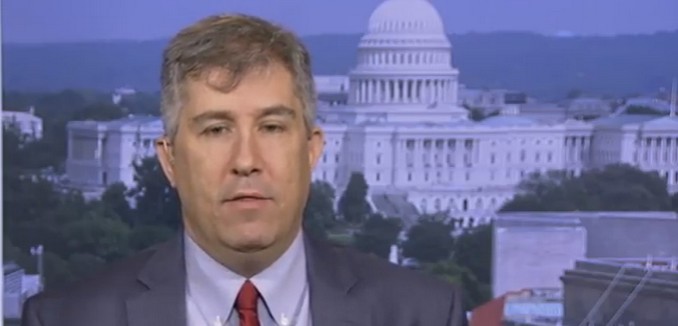President Barack Obama changed his mind about launching a retaliatory strike against Syrian President Bashar al-Assad, whose forces carried out a sarin gas attack that killed more than 1,400 people in August 2013, after Iran threatened to pull out of then-secret nuclear talks, the chief foreign correspondent for The Wall Street Journal said on Monday.
In her interview of Jay Solomon, MSNBC’s Andrea Mitchell asked if there was an “Iranian component” to Obama’s decision not to strike the Syrian regime after it violated his “red line” on chemical attacks. Solomon answered that both American and Iranian officials told him that if the U.S. had retaliated against Assad, Iran’s Islamic Revolutionary Guard Corps would have scuttled the nuclear talks.
“When the president announced his plans to attack and then pulled back it was exactly the period in time where American negotiators were meeting with Iranian negotiators secretly in Oman to get the nuclear agreement,” Solomon said. “U.S. and Iranian officials have both told me that they were basically communicating that if the U.S. starts hitting President Assad’s forces, Iran’s closest Arab ally — sort of the ability to project their power through the Middle East into Lebanon and the Palestinian territories — these talks could not conclude. The IRGC, the Revolutionary Guard would not accept a continued engagement with the U.S. if their closest ally was being hit.”
.@WSJSolomon: Iran threatened to end nuclear talks if @POTUS enforced red line against Assad after chemical attack: pic.twitter.com/czFeFA2K10
— Kenan كنان (@KenanRahmani) August 22, 2016
Shortly after reports of the devastating chemical attack in Ghouta first surfaced three years ago this week, Obama asked, “What message will we send if a dictator can gas hundreds of children to death in plain sight and pay no price?” However, Obama reportedly changed his mind about striking Assad after discussing the situation with his chief of staff, Denis McDonough.
Solomon’s report aligns with several other analyses of the president’s positions on Syria. Former White House official Michael Doran wrote last February that most of Obama’s Middle Eastern policies could be explained when viewed as efforts to engage Iran diplomatically. Examining the president’s reasons for his about-face on bombing Assad, Doran wrote, “Could they have included fear of scuttling the biggest—and still secret—foreign-policy initiative of his second term, possibly of his entire presidency?”
Frederic Hof, formerly a top adviser to the Obama administration on Syria, wrote in May that the Obama administration’s failure to protect Syrian civilians stemmed from its desire to secure a nuclear agreement with Iran. “For a man of Barack Obama’s evident humanity and values, surely there has been something of transcendent importance that has stayed his hand from protecting Syrian civilians; … we know now what it has been: pursuit of a nuclear agreement with Assad’s premier long-term enabler and partner in mass murder: Iran.”
[Photo: MSNBC / YouTube ]




